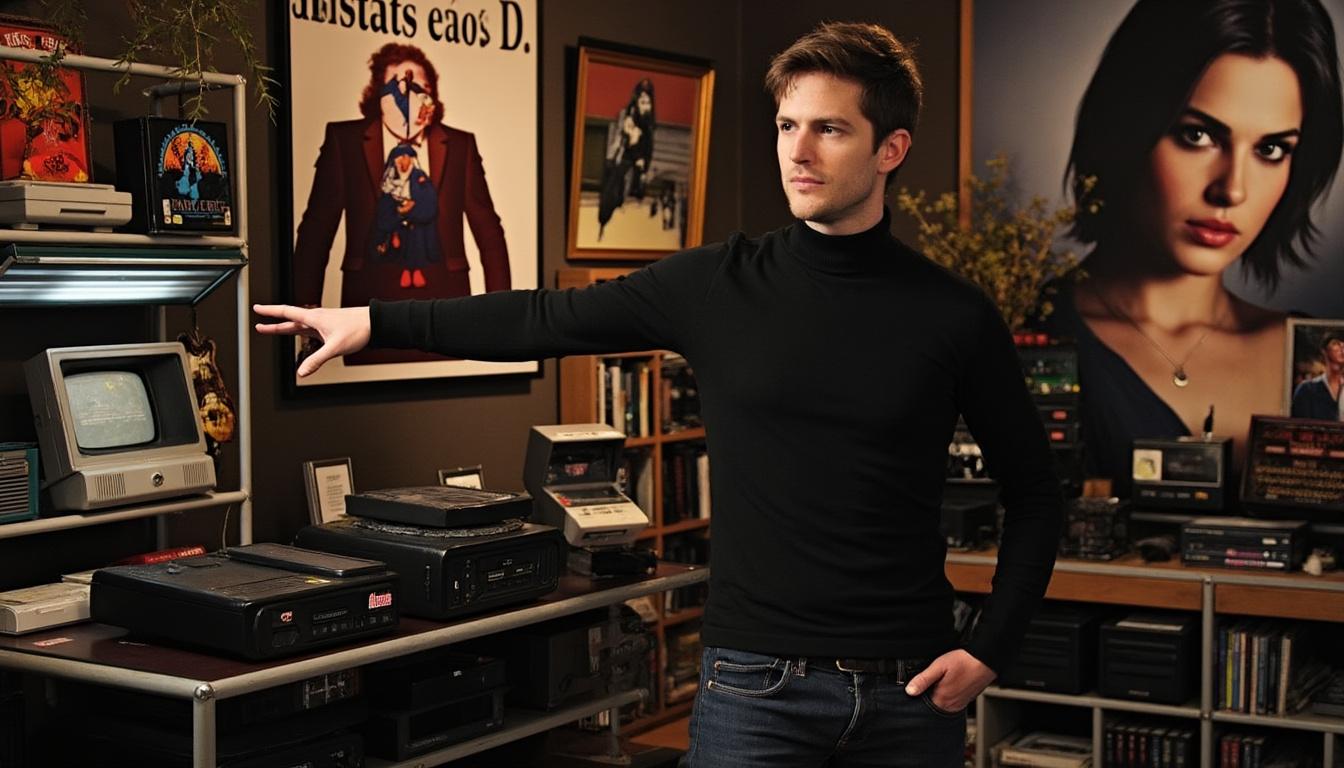As the hype surrounding the newest installment of the Resident Evil franchise intensifies, the director, Zach Cregger, has shared thoughts that might send ripples through the fandom. Cregger, known for his distinct approach in films such as the 2022 horror hit “Barbarian,” is gearing up for his adaptation that reportedly will veer away from the traditional narratives established by the beloved video game series produced by Capcom. The franchise boasts a massive legacy, and with previous film adaptations attempting to encapsulate its essence, it begs the question: what happens when a director decides to shift focus from the original lore?
Deviating from the Lore: A Bold Move by Zach Cregger
During a recent conversation with SFX Magazine, Zach Cregger articulated his intentions for the movie, indicating that he will not strictly adhere to the Resident Evil mythos. This admission comes with undeniable risks, especially in a fanbase as passionate as the one surrounding the long-running series. Cregger passionately identified himself as a devoted fan of the video games, stating, “I’ve played them all. I don’t know how many times I’ve just looped [RE4] again and again.” His proclamation highlights a dilemma: how to honor the game’s spirit while crafting a narrative that stands independently.

Cregger’s narrative aspirations focus on capturing the authentic experience of playing the games. Rather than merely recreating iconic scenes, Cregger aims to encapsulate the raw feelings elicited while navigating through the zombie-infested landscapes that fans know and love. This perspective leads to a significant question: what elements does he believe are vital to retain from the original games?
Key Elements in the New Resident Evil Film
- Atmosphere: Cregger emphasizes maintaining the eerie and suspenseful ambiance characteristic of the games.
- Character Development: He intends to delve deeper into character arcs that allow audiences to connect with the protagonists beyond their roles in zombie combat.
- Innovative Storytelling: Introducing fresh narratives and twists that could redefine the lore while respecting pivotal game moments.
Despite his enthusiasm, Cregger is acutely aware of the potential backlash. In an era where online critics wield significant influence, he remarked, “No matter what I do, people are going to come for me online.” This foresight reflects a growing concern within the entertainment industry—how fan expectations can dramatically affect a project’s reception.
Historical Context of Adaptations
The Resident Evil franchise has faced a tumultuous journey in film adaptations. Under the helm of Paul W.S. Anderson, the original series featured Milla Jovovich as Alice, creating a unique spin on the game’s storylines. Although these adaptations were commercially successful, they often strayed far from the source material, leading to mixed reactions. Fans expressed their frustrations through forums and social media, highlighting inconsistencies in character development and the deviation from the expected plotlines.
In contrast, Cregger’s project appears to acknowledge this legacy while charting a new course. To gain an understanding of how fans might perceive this shift, examining the various reactions to past adaptations provides insight into what could become an integral part of Cregger’s narrative approach.
| Film Title | Release Year | Box Office Gross | Fan Reception |
|---|---|---|---|
| Resident Evil | 2002 | $102 million | Mixed |
| Resident Evil: Afterlife | 2010 | $296 million | Positive |
| Resident Evil: The Final Chapter | 2016 | $312 million | Negative |
| Resident Evil: Welcome to Raccoon City | 2021 | $41 million | Negative |
With numerous adaptations rising and falling, the trajectory of film interpretations of the Resident Evil games illustrates the challenges that Cregger must navigate. As fans look forward to 2026, many will undoubtedly scrutinize whether this latest iteration honors its legacy while boldly stepping into uncharted narrative territory.
Navigating Fan Expectations: The Pros and Cons of a New Direction
The core of any adaptation lies in its resonance with the audience. Fan expectations a crucial aspect defines a film’s success. With the previous films having formed a deeply entrenched connection to the franchise, Cregger’s decision to diverge from established lore could position him at a precipice of chaos or creativity. There are both advantages and drawbacks to this unorthodox approach.
Advantages of Diverging from Traditional Storylines
- Creative Freedom: Not being bound to existing narratives allows for innovative storytelling and the introduction of original characters that resonate with new audiences.
- Attracting New Viewers: A fresh take could draw in individuals who may overlook the franchise due to past films, potentially broadening the fanbase.
- Relatability: By developing unique story arcs, Cregger can explore contemporary themes that might reflect an audience’s current concerns—even in a post-apocalyptic world.
Potential Downsides of Shifting Focus
- Alienating Established Fans: Longtime fans might feel betrayed if beloved characters are sidelined or if significant plot points are altered drastically.
- Criticism of Inauthenticity: If the film fails to capture the essence of the games, it could be labeled as an imposter—losing credibility in the eyes of the audience.
- Online Backlash: As Cregger acknowledged, the online environment can be unforgiving, with fans voicing their displeasure vehemently.
This duality exposes a broader conversation within the film community about the delicate balance between innovation and tradition. As storytelling evolves, the industry continually wrestles with the ramifications of decisions similar to those facing Cregger.

The Role of Marketing in Keeping Fans Engaged
Marketing a film like the upcoming Resident Evil reboot hinges primarily on how effectively the production team can connect with its varied audience segments. By utilizing platforms such as Netflix, which had previously aired a live-action series alongside animations based on the gaming franchise, the director can tap into existing fandoms. This marketing strategy doesn’t only focus on catering to the loyal video game players; it seeks to engage the broader audience who might be unfamiliar with the stories.
Strategies for Engaging Fans and New Audiences
- Interactive Campaigns: Engaging fans through social media by creating polls, quizzes, and discussion forums about the characters and games can foster a sense of community.
- Behind-the-Scenes Content: Sharing insights into the creative process, character design, and filming can ignite excitement before the official release.
- Cross-Promotional Partnerships: Collaborating with brands, such as gaming merchandise producers and streaming services, can create buzz through physical and digital avenues.
Marketing serves not only to promote the upcoming Resident Evil movie but also to manage the expectations of audiences. By communicating the themes, goals, and overall tone, Cregger’s team can mitigate potential backlash by ensuring fans understand the intentions behind every creative choice.
Engagement Through Social Media
The power of social media cannot be understated in reaching fans and creating dialogue. Platforms like Twitter and Instagram present opportunities for daily interactions, while YouTube serves as a medium for trailers and fan reactions. For instance, an effective strategy could involve weekly updates on production, turning followers into advocates for the film.
The Importance of Audience Reception
Ultimately, audience reception will dictate the perception of the new Resident Evil film, determining its success beyond box office grosses. As history indicates, film adaptations often live and die by the audience’s engagement and perception—not solely the narrative choices made by the director.
Analyzing Audience Reactions
The ability to gauge how audiences will respond to creative decisions lies primarily in analyzing trends from past films. By comparing Resident Evil: Welcome to Raccoon City‘s almost universally negative criticism with more favorable receptions of the earlier films, Cregger can align his approach to cater to various fandoms. Tracking platforms such as GameSpot can offer insight into ongoing sentiments.
Strategies for Managing Audience Expectations
- Engaging Pre-Release Discussions: Opting for fan events or Q&A sessions can enable the director and production team to bond with enthusiasts and understand their perspectives.
- Transparency in Creative Direction: Sharing the rationale behind narrative choices can help fans feel acknowledged and respected, reducing backlash.
- Emphasizing the Core Appeal: Focusing on the thrilling elements of survival horror that the franchise embodies can rekindle excitement.
As Cregger shapes his vision for the upcoming Resident Evil film, the intricate ballet between innovation, fan expectations, and marketing strategies becomes crystal clear. The narrative he crafts will not only determine its fate in theaters but will also influence the future direction of adaptations within the cinematic landscape.


